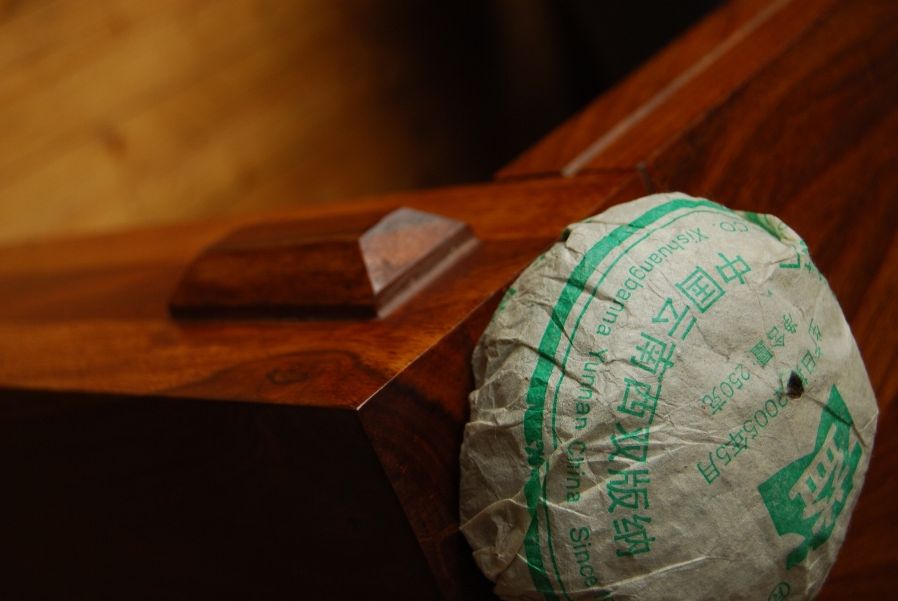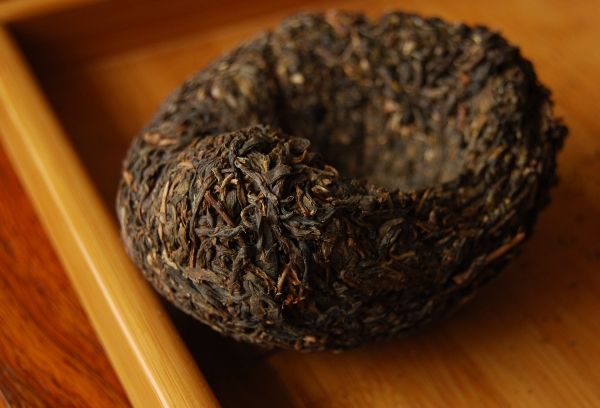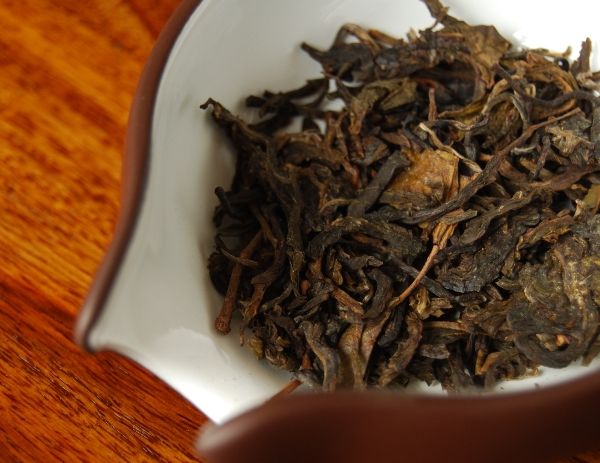I bought this tea during the first year of my doctoral degree, and during the second year of Lei's. It has travelled with us, through our various houses, changing locations each year, before finally settling in our eventual home. Like the couple with whom it travelled, this tea has come a long way, and is a "work in progress".
I checked the Half-Dipper to find my previous notes on this tea, but was amused to find that there were none. So, I have the opportunity to add my list of notes with a tea that I remember loving very much, and which I haven't touched in over three years.
I bought this tea from Yunnan Sourcing on release, and have been searching high and low for further examples. Happily, it is quite common on Taobao, where it sells today for less than I bought it originally.
It is a big, beefy tuocha, weighing in at a decidedly hefty 250g. "Zaochun" means "early spring", and I believe that 2005 was the last time that this was made. Since then, we have others to replace it, such as the delicious "08 Tuocha".
The compression is very sociable: it is tight enough to age nicely, but loose enough that leaves can be separated without breaking them. As you can see, they are medium-sized leaves. Almost no tips exist in the blend, but there are plenty of stems and huangpian [yellow flakes].
I remember this tea being super-green, and spicy. In the three years since we've sat down together, this tea has changed greatly. It is fascinating to be able to observe these changes first-hand, with knowledge of how the tea tasted originally.
It remains an honest, untainted yellow, which I find very encouraging. As before, it has tons of kuwei [pleasant bitter taste] - it's a real eye-opener. Unlike before, the main body of the flavour has changed from fresh green Menghai straw to a pine-like sweetness.
This tea has been caught right in the midst of the changes of its adolescence. It has the potent kuwei of youth, and some hints of the woody territory into which it will age. At the moment, it's not a very enjoyable drink. That pine-like woodiness is not yet developed, and the kuwei has not yet changed. It's simply too aggressive, but without the fresh Menghai flavour of green tea, after its four years.
It remains an honest, untainted yellow, which I find very encouraging. As before, it has tons of kuwei [pleasant bitter taste] - it's a real eye-opener. Unlike before, the main body of the flavour has changed from fresh green Menghai straw to a pine-like sweetness.
This tea has been caught right in the midst of the changes of its adolescence. It has the potent kuwei of youth, and some hints of the woody territory into which it will age. At the moment, it's not a very enjoyable drink. That pine-like woodiness is not yet developed, and the kuwei has not yet changed. It's simply too aggressive, but without the fresh Menghai flavour of green tea, after its four years.
This is an honest, powerful tea, and I'm definitely going to be buying several more tubes. My strategy with teas at the moment is to buy one or two pieces to test, via costly international postage, then, if those test purchases turn out to be decent, buy in quantity and ship it via internal mainland post to Lei's family home, where we will collect it on our next visit.
P.s. I'm off to the south of France (Grenoble). If you're going to "IEEE Machine Learning for Signal Processing 2009" then look me up. I'm bringing tea!







5 comments:
Aah, the teas we bought for special occasions and which follow us through life...
I celebrated my 30th birthday with
a sheng pu erh of the year of my birth and have two jars full of
dancong and oolong from the same year...every year on my birthday I open them for one session of tea and close them right afterwards.
And on special events of my life I bought some special tea for storage so that we go together through the journey of life...
Indeed, life isn't worth living without tea...
That sounds lovely, Kim.
I've just discovered "Cha Yuan" here in Grenoble - I wasn't expecting gongfucha and Chinese teashops here in the south of France!
A bientot,
'obbes
This is a good encouragement to have patience with Pu-erh tea. However, I don't quite understand that you like this tea selection so much when you're not too pleased with how it tastes. Is that because a great Pu-erh is hard to find for the critical taster? --Spirituality of Tea
Dear Jason,
It tasted great when I bought it, but it has started to age. There can be a "difficult time" in the life of a pu'er when it is in transition from fragrant youth to woody age, at which point it may become less enjoyable. This tuocha is aging nicely, and will (probably, hopefully) turn into something decent, but cannot be enjoyed at the moment, during its transition.
Toodlepip,
Hobbes
As with some (half-bottle) wines ...they too go through a "mid-life crisis" after which they accept the fact that age is inevitable and become happy again after that particular acknowledgement. (I like the other reader's term "lurking in the background ... and I am sure there are many more like us)...
Hardly anonymous...
shaveBandito
Post a Comment